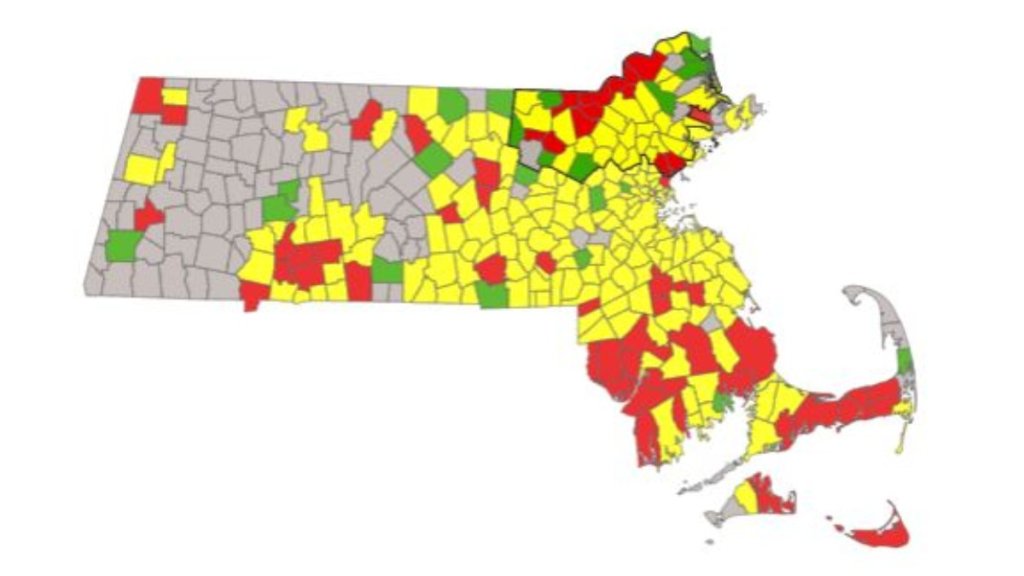The number of Massachusetts communities at the highest risk of coronavirus transmission has fallen after rising for weeks.
The town-by-town coronavirus data released Thursday showed 59 communities in the high-risk red zone, down from 77 last week.
The metric rose for the previous three weeks, but it didn't come close to its peak from mid-January, when there were 229 cities and towns in the red zone.
The town-by-town coronavirus risk data classifies communities' risk level on a scale from red, the highest, to grey, and is one of many metrics tracked by the state that had been showing the latest COVID surge subsiding, though others are also on the rise. (See this week's full list of red zone communities below.)
The governor also announced a week-long initiative starting next week aimed at increasing vaccine access for people from communities that have been disproportionately affected by COVID-19.
Last Thursday's report moved from the pdf file where it had been reported for months to the state's interactive COVID database. The tab with the data also brought back the map showing the Massachusetts communities at highest risk that the department used to share, now in an interactive form.

Map showing the coronavirus risk category for Massachusetts cities and towns between March 28 and April 10.
Massachusetts COVID Hot Spots
The following 59 communities are in the highest risk level as of Thursday: Adams, Avon, Ayer, Barnstable, Brewster, Brockton, Chelmsford, Chicopee, Dennis, Dighton, Dracut, Edgartown, Fall River, Freetown, Hamilton, Hanson, Harwich, Haverhill, Holyoke, Lawrence, Lee, Littleton, Lowell, Ludlow, Lynn, Mashpee, Methuen, Middleborough, Milford, Monson, Nantucket, New Bedford, Oak Bluffs, Orange, Paxton, Plainville, Plymouth, Rehoboth, Revere, Saugus, Seekonk, Somerset, Southwick, Springfield, Sterling, Sutton, Swansea, Taunton, Templeton, Tisbury, Tyngsborough, Wareham, West Boylston, West Bridgewater, West Springfield, Westport, Whitman, Williamstown and Yarmouth.
Of those communities, seven are newly in red on the list this week: Avon, Harwich, Haverhill, Lee, Southwick, Sterling and Templeton.
And 25 communities dropped out of red: Abington, Athol, Billerica, Blackstone, Carver, Chatham, East Longmeadow, Everett, Framingham, Granby, Halifax, Hampden, Hopedale, Hull, Lakeville, Mansfield, Palmer, Peabody, Raynham, Sandwich, Southampton, Southborough, Ware, Wenham and Winchendon.
To qualify for the red, high-risk category under the metrics, communities with populations under 10,000 must have more than 25 cases. For mid-size communities of between 10,000 and 50,000 people, they must have an average of more than 10 cases per 100,000 people and a positive test rate of more than 5%. And for larger communities of greater than 50,000 people, they must have more than 10 cases per 100,000 people and a positive test rate of more than 4%.
Previously, the state used the number of cases detected on average each day over two weeks to determine if Massachusetts' communities are at high risk for coronavirus transmission. The new list factors in population size and positive test rate.
The Link LonkApril 16, 2021 at 06:46AM
https://www.nbcboston.com/news/coronavirus/number-of-mass-communities-in-high-risk-covid-red-zone-goes-down-after-weeks-on-the-rise/2356314/
Number of Mass. Communities in High-Risk COVID Red Zone Goes Down After Weeks on the Rise - NBC10 Boston
https://news.google.com/search?q=Red&hl=en-US&gl=US&ceid=US:en

No comments:
Post a Comment